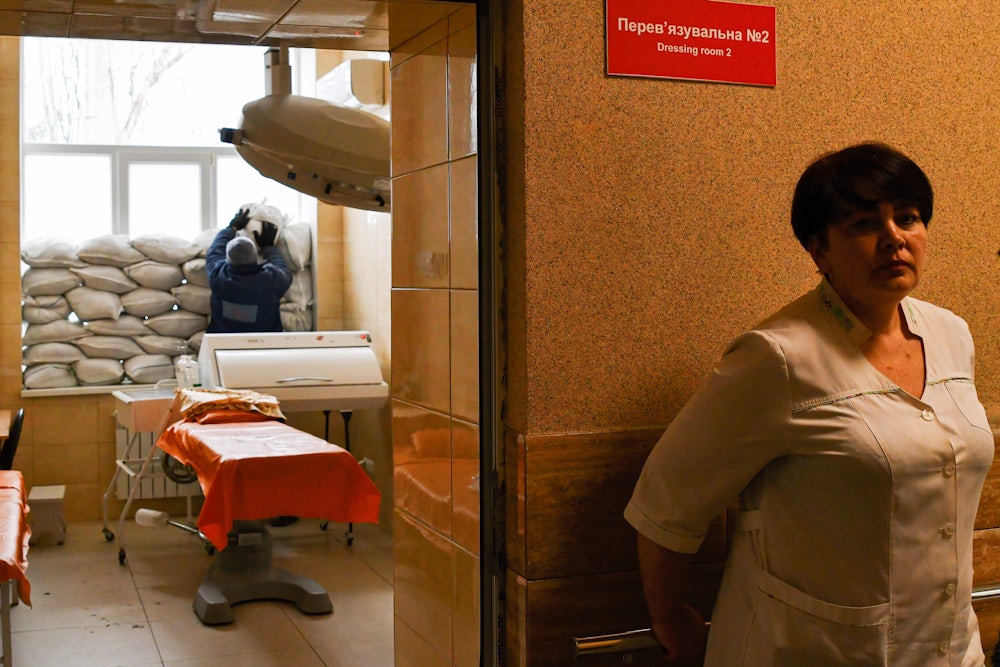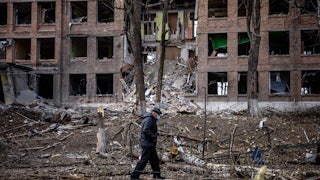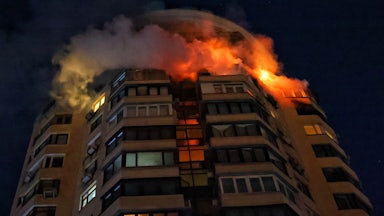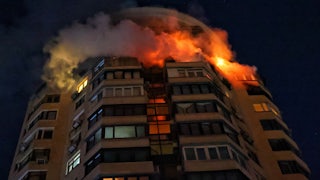Russian President Vladimir Putin didn’t plan on such fierce military resistance to his invasion of Ukraine, and now he’s predictably lashing out. Russian forces have begun indiscriminately bombing civilian targets, including in a missile strike Tuesday in Zhytomyr, 90 miles west of Kyiv, that destroyed the Pavlusenko maternity hospital, according to reporters and Ukraine’s foreign ministry. At least two people died in the bombing.
📍Maternity home in Zhytomyr destroyed with 🇷🇺 calibres.
— MFA of Ukraine 🇺🇦 (@MFA_Ukraine) March 2, 2022
If it’s not a genocide, what is that? pic.twitter.com/1zoMUywgf7
Russia reportedly intended to hit a nearby military base, but it’s not the first time a hospital has come under attack since Putin’s invasion began. “Russian airborne troops landed in Kharkiv … and attacked a local hospital,” the Ukrainian army said in a statement on Telegram, the messaging app. And last week, Russia dropped a cluster bomb outside a hospital in Vuhledar, Donetsk Oblast. “The attack killed four civilians and injured another 10, six of them healthcare workers, and damaged the hospital, an ambulance, and civilian vehicles,” said Human Rights Watch, which investigated and verified documentation of the attack.
It’s not clear if the Central City Hospital was the intended target in this earlier bombing, but it certainly wouldn’t be out of character. Attacking hospitals has long been part of Putin’s military strategy—and one he has gotten away with, at least for now.
The attack in Zhytomyr is reminiscent of, albeit not as destructive as, Russia’s 1999 bombing of a maternity hospital in Grozny, Chechnya, which killed at least 27 people—most of them newborns and mothers. Medical facilities were similarly targeted when Putin annexed Crimea and Donetsk in 2014: Russian forces seized a hospital in Simferopol and shelled a hospital in the city of Donetsk, killing four.
But nowhere is Russia’s penchant for attacking hospitals more apparent than in Syria, where Putin came to the defense of dictator Bashar Al Assad amid the country’s civil war. Physicians for Human Rights, a Nobel Peace Prize–winning organization, has corroborated 243 attacks on medical facilities, plus the killing of 115 medical personnel, by either Russian or Syrian government forces in the country’s civil war, between 2011 and 2021. (Determining who was responsible in these instances proved impossible, but Russia provided extensive—and ultimately decisive—air and ground support.)
In Syria, Russian forces operated beyond the reach of the International Criminal Court. “Neither Syria or Russia are parties to the ICC, nor have they accepted jurisdiction of the court,” said John Bellinger, an expert in international law and a former legal adviser to the U.S. State Department and the National Security Council. In Ukraine, though, those ordering and committing war crimes should not expect to be similarly shielded: “The government has cleverly filed a narrow declaration with the court accepting its jurisdiction for war crimes in Ukrainian territory after 2014.”
But building such a case is complex, and winning one is rare. “There aren’t a lot of war crime prosecutions involving targeting, which are called conduct of hostilities cases,” said Alex Whiting, a professor at Harvard Law School and a former deputy prosecutor and lead investigator at the ICC. “They’re particularly challenging cases to bring because of the intent requirement. You have to prove the accused intended to target civilians or to use disproportionate force, and that’s often hard.” Historically, prosecutors have favored bringing charges against those responsible for massacres or other more easily demonstrated crimes.
Whiting, however, is one of the few who have successfully argued such a case. As the lead prosecutor in several trials related to the war in the former Yugoslavia, he won a conviction in a targeting case related to the bombardment of Sarajevo, which lasted for more than two and a half years. “In the modern times there has not been a clearer case of the targeting of civilians,” he recalled. “I mean it was on television all the time. There was no doubt about what was happening, and even that case proved challenging to prosecute. It became a lot of work to prove that individual sniping and shelling incidents were illegal and constituted crimes.”
But Whiting and many others see reason for hope, noting the technological advances of the last 20 years. Both the development of large caches of open-source intelligence captured by cell phones and troves of data from spy agencies like the National Security Agency and the U.K.’s Government Communications Headquarters have the potential to fundamentally change the prosecution of war crimes.
“The great thing about digital information is that can be easily captured and shared. But it can almost as easily be manipulated and shared,” said Wendy Betts, the director of an organization called eyeWitness. To ensure that data captured by civilians in war zones meets the rigorous standards needed for use in future prosecutions, the group spent four years developing an app that reliably captures geo-coordinates, time stamps, and proof that images or videos were not altered prior to being uploaded to secure servers. “We designed the app specifically around these type of contexts that are high security risk and low infrastructure capacity,” Betts said. (Among other features, the app can be hidden behind various fake icons and encrypts its data. Data recorded on the app has been used in the prosecution of two rebel commanders in the Democratic Republic of Congo.)
Even with such technological advances, there remains the challenge of proving intent. “It’s not automatically a war crime if a hospital or ambulance gets hit,” John Bellinger, the former NSC attorney explained. “For there to be a war crime prosecution, the prosecutor has to show that the attacking side blew something up intentionally knowing that it was a protected medical facility and that there was no military necessity. And that gets down to intelligence.”
There is strong precedent for states to share basic intelligence with the ICC. In the case of the massacre at Srebrenica, the U.S. government shared satellite photos of mass graves and reburials that proved critical to the prosecution. According to Whiting, it is also common for governments to share radio intercepts from the battlefield. Such intelligence is rarely adequate to implicate ranking military figures or those at higher echelons of power, though. Governments have historically been less willing to share the kind of intelligence that might incriminate such figures, “out of fear it will compromise their methods,” Whiting said. “Tribunals are necessarily public events, and when you share information with a tribunal, you have to accept that it’s eventually going to be part of a public proceeding.”
Bellinger argues that governments can and should be more forthcoming with such evidence. “Looking at the current situation, it seems like the British have the best intelligence in Ukraine,” he said. “If they or anybody else has intelligence that the Russians are targeting Ukrainian hospitals, which we know the Russians do, they should share that.” He added, “It’s very difficult to hold Russia accountable. But this is a bedrock principle, and if we can show that Russia is targeting hospitals and get the ICC to prosecute for it, well that’s a pretty big thing.”








